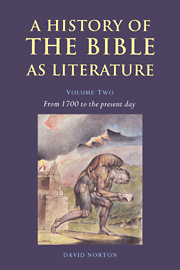Book contents
- Frontmatter
- Contents
- List of abbreviations
- 1 The early eighteenth century and the KJB
- 2 Mid-century
- 3 The critical rise of the KJB
- 4 Romantics and the Bible
- 5 Literary discussion to mid-Victorian times
- 6 The Revised Version
- 7 ‘The Bible as literature’
- 8 The later reputation of the KJB
- 9 Narrative and unity: modern preoccupations
- 10 This (spiritual) treasure in earthen/earthenware/clay vessels/pots/jars
- Appendix
- Bibliography
- General index
- Biblical index
1 - The early eighteenth century and the KJB
Published online by Cambridge University Press: 05 June 2012
- Frontmatter
- Contents
- List of abbreviations
- 1 The early eighteenth century and the KJB
- 2 Mid-century
- 3 The critical rise of the KJB
- 4 Romantics and the Bible
- 5 Literary discussion to mid-Victorian times
- 6 The Revised Version
- 7 ‘The Bible as literature’
- 8 The later reputation of the KJB
- 9 Narrative and unity: modern preoccupations
- 10 This (spiritual) treasure in earthen/earthenware/clay vessels/pots/jars
- Appendix
- Bibliography
- General index
- Biblical index
Summary
‘All the disadvantages of an old prose translation’
The superior language
Yet how beautiful do the holy writings appear, under all the disadvantages of an old prose translation? So beautiful that, with a charming and elegant simplicity, they ravish and transport the learned reader, so intelligible that the most unlearned are capable of understanding the greater part of them.
(P. 30)So exclaims in 1731 the very minor poet and critic, John Husbands (1706–32). He seems to be saying that the KJB, in spite of being rather bad by his standards, is, after all, very good. This curious combination of praise and dispraise is one of a line of such remarks that reflects conflicting forces among the literati of Augustan England. Before exhibiting these remarks, some of the forces need to be sketched.
The phrase ‘an old prose translation’ suggests the three main negative elements. The disadvantage of being a translation needs no comment — everybody believed that translation must necessarily be inferior to the original, especially if that original was divinely inspired — but we are accustomed to admiring prose and do not think of the language of a hundred years ago or less as particularly old. We certainly do not think it worse than present-day English: quite the reverse (see below, p. 434).
- Type
- Chapter
- Information
- A History of the Bible as Literature , pp. 1 - 52Publisher: Cambridge University PressPrint publication year: 1993



